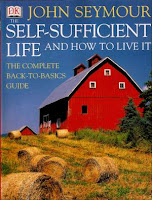 The Self Sufficient Life and How to Live It by John Seymour. Recommended.
The Self Sufficient Life and How to Live It by John Seymour. Recommended.
Doomer Alert: I have been trying to expand my knowledge of simpler times, in the off chance that peak oil (or any one of the other ulcer-forming scenarios) really does end civilization as we know it. So far this has consisted of checking out a variety of library books on the following topics: gardening, alternative energy sources, food preservation, organic agriculture/horticulture, survival, and overall self sufficiency. Many of these books I found to be of little-to-no use, so I have not been posting reviews. I do believe this book has merit, dear reader, so I thought I would take the time to share it with you.
I will preface this review with the following comments. I doubt that there is any complete self-sufficiency guide. This book comes pretty close to the mark. It spans a wide range of topics and each topic has a good amount of depth. I tend to think of this book as an overarching primer, that would give you a starting point to begin research in each specific arena. (You aren't going to become an expert/competent bee-keeper after reading one page about it) Obviously, each topic most likely has volumes written about it, so to think that one book cold completely cover all the topics that a human would need to be totally self-sufficient is asking a little much. With that said, I will outline the book's many topics:
- Overview of Self-Sufficiency
- Food from the Garden
- Food from Animals
- Food from the Fields
- Food from the Wild
- Dairy Processes
- Kitchen Skills
- Brewing/Winemaking
- Energy and Waste
- Crafts and other skills
- Contacts and References
An Urban Garden
A Community Garden
A One-Acre Farm
A Five-Acre Farm
I also enjoyed the gardening section, which delineated the development of seedlings, planting, and harvesting of many vegetable and fruit varieties. Also of note was the description of small scale farming of grains and root crops in fields, as well as suggestions for crop rotation.
The book shows us there are many things to learn if one was to consider being completely self-sufficient. The main thing I learned was that: I don't want to have to become completely self-sufficient. For some, it may conjure up romantic images of Little House on the Prairie, but honestly, it would stink. I know, people have been doing it for thousands of years; heck, large portions of our population lived this way less than 2 generations ago. I give my respect to those hardy souls, but I would prefer not to be tested in such a way.
Fortunately, I do not think that it is guaranteed (or even really likely) that my family or I will ever be forced to become entirely self-sufficient. This does not mean it is not wise to begin to learn several sets of these skills. If a long term recession/depression hits the US/world, many of these skills could make a huge difference in overall quality of life. So, I will continue to research these topics, and share them with the few folks that happen to stumble upon these words.



2 comments:
This is a great resource!
Have you ever thought about living a self-sufficient life and monetizing your small farm? Do you live on a small farm? Is there something on your farm that you never thought of using to make extra income? Well, I am going to give you some ideas on how to take your small farm and monetize it. Here are a few examples of how I make money on my farm. After reading this article, I have no doubt that you will be making extra income from something that you enjoy doing.
Do you have chickens? Ever thought about selling farm fresh eggs? My neighbors are always putting in an order for farm fresh eggs. I sell an average of 20 dozen per week at $2.25 per dozen! I started out with one customer, and by word of mouth, I now have about 15 weekly customers and that number continues to grow. I now need to increase my laying hens.
Do you have a small garden? Ever think about selling farm fresh produce? I sell fresh tomatoes, potatoes, cabbage, squash, cucumbers and much more. I do this right from my farm. I have no need to go to the farmers market. Once you build a good reputation with your neighbors, the word gets out and you will have more demand then you can supply. Everyone wants fresh farm products and really do want to support their local farmers. It’s a win-win solution for everyone.
Do you have a milk cow? Sell fresh farm milk to your neighbors! Or maybe you have plenty of timber for firewood? There are many ways to optimize your small farm and learn how to live a more self sufficient healthy lifestyle at the same time.
I could keep going, but I think you get the point. All of these hobbies can really add up and everyone benefits.
I've thought about all of those things, farmersteve. I have much respect for those that can make a living off the land. I do not live on a farm, but I am slowly adding more food production to my yard. Check out some of my gardening posts to see more. Thanks for the visit!
Post a Comment